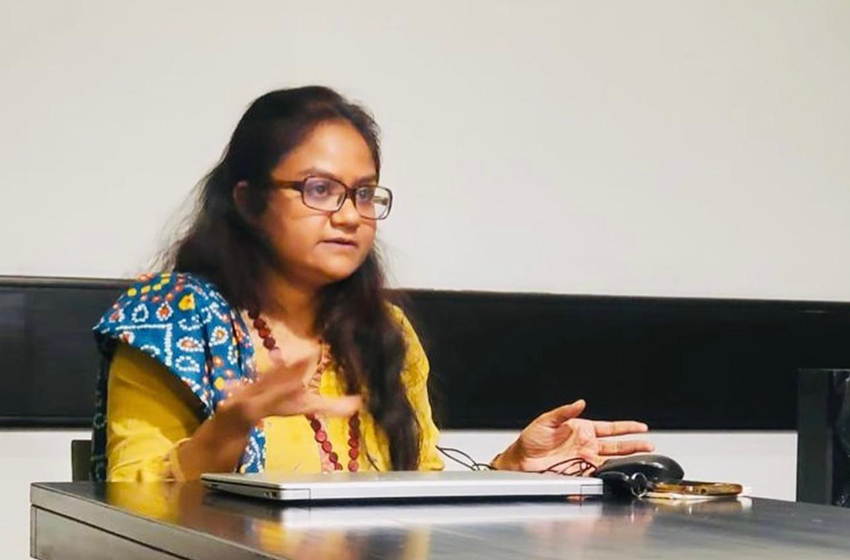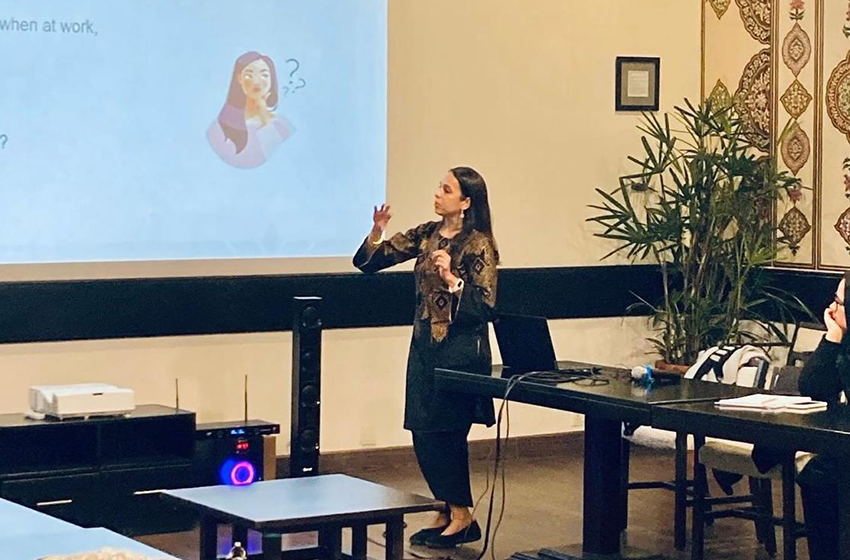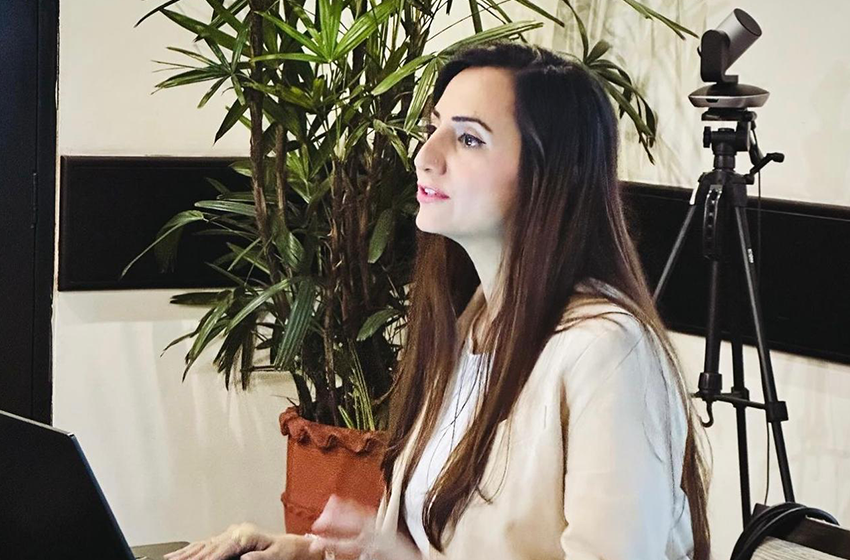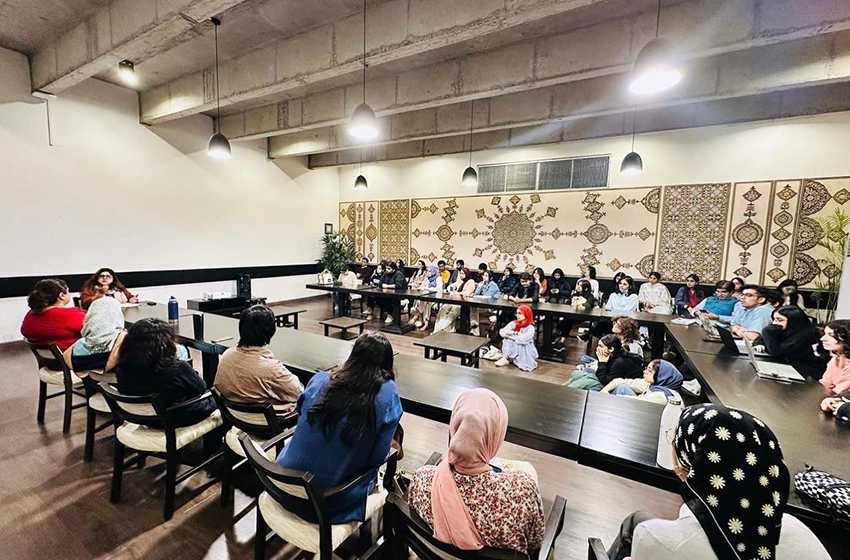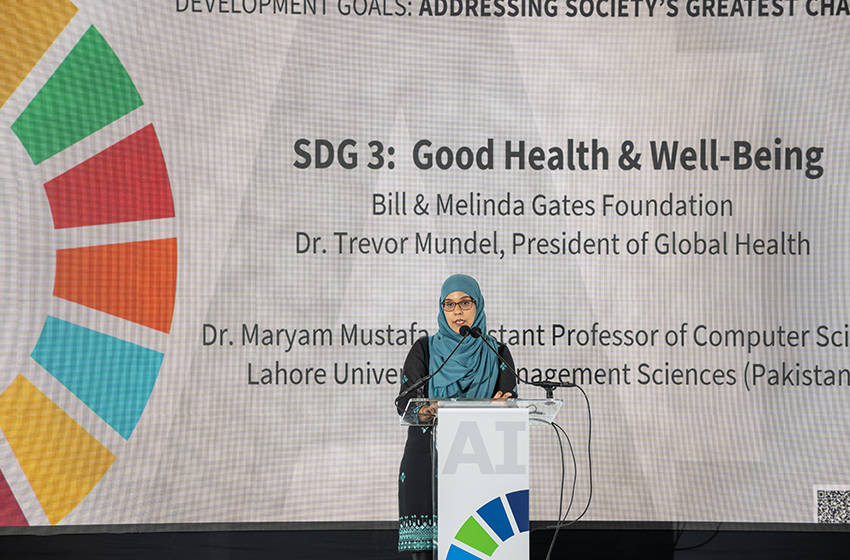Director in Focus
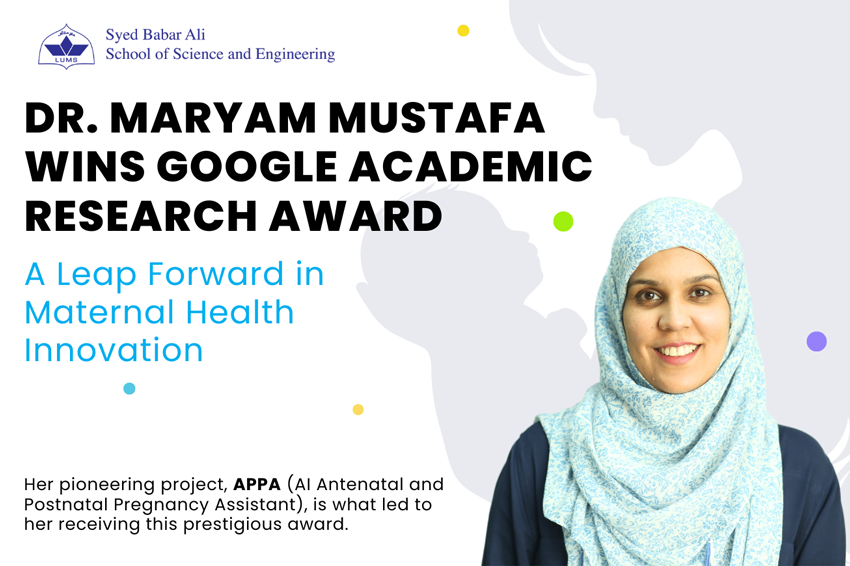
Google Academic Award
Dr. Maryam Mustafa, Director of SWGI, along with her Co-PI Dr. Beena Ahmed from the University of New South Wales, were awarded the Google Academic Research Award for 2024 (GARA).
Dr. Mustafa received this recognition for her pioneering project, APPA: AI Antenatal and Postnatal Pregnancy Assistant, which harnesses the power of Large Language Models (LLMs) to develop a speech-based AI tool. APPA empowers midwives to deliver critical information and support in Urdu to expecting mothers. Designed specifically for low-literate pregnant women, APPA provides accessible at-home resources, timely reminders, guidance, and support directly through speech-enabled smartphones.
Featured by Gates Foundation
Dr. Maryam Mustafa was featured by the Gates Foundation for her work on Awaz-e-Sehat, an accessible and affordable technology designed to help health workers detect pregnancy risks early—ultimately saving the lives of mothers and babies.
Awaz-e-Sehat is a voice-assisted app designed specifically for frontline health workers. Using simple smartphones, the app guides providers through structured questions in local languages to help identify early warning signs of conditions such as pre-eclampsia or gestational diabetes during brief consultations. By capturing patient responses in real time and flagging potential risks, the tool supports more attentive, informed care—even in the most resource-constrained settings.
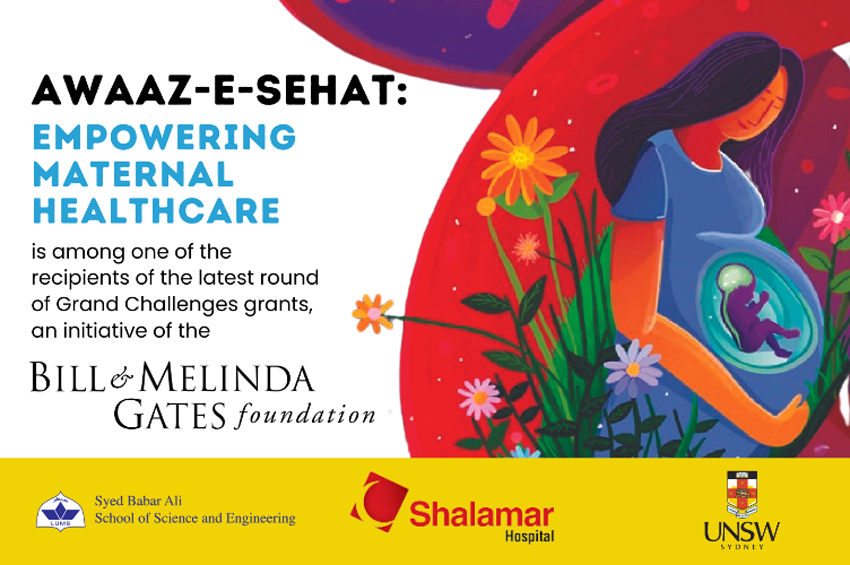
Talks and Events
SWGI is committed to promoting interdisciplinary work by both academics and practitioners. Guided by an intersectional approach to gender-based research and gender justice, the centre believes that learning must occur in all spheres. This year, SWGI organised eight conversations, comprising a mix of talks and workshops.
Innovating Health: Sehat Kahani & the Era of Global Digital Healthcare
Dr. Sara Saeed, co-founder and CEO of Sehat Kahani, joined SWGI for its second event. A graduate of DOW University of Health Sciences, she has over eight years of experience in the field of digital healthcare. In this conversation, she shared how her personal journey as a working woman, doctor, and mother led her to build a telemedicine platform like Sehat Kahani. Through this endeavour, she aimed not only to make affordable healthcare services accessible to people living in rural areas or situated in remote locations, but also to provide women doctors the opportunity to work from home.
Women's Labour Force Participation in South Asia
Margaret Triyana, Senior Economist at the World Bank's Office of the Chief Economist for the South Asia Region, SWGI to discuss women’s participation in the labour force across South Asia. She shared that despite expansion opportunities for all, including many women, employment has remained a source of untapped potential, with the region’s female labour force participation among the lowest in the world. She emphasised the importance of legal reforms to promote gender equality, faster job creation in non-agricultural sectors, and the removal of barriers that prevent women from working outside the home, as they could play an integral role to bolster labour force participation.
Vulnerability, Resilience, and Unequal Impacts: The Gendered Experience of Climate Change and Health in Pakistan
Neha Mankani, a midwife and founder of the Mama Baby Fund, joined SWGI for a powerful session. Drawing from her extensive work in midwifery and climate justice, she highlighted how climate change disproportionately affects women, especially pregnant and postpartum mothers, as well as newborns. She shared stories from her work on Baba Island, a densely populated fishing community off the coast of Karachi, where rising sea levels, extreme heatwaves, and polluted water create insurmountable challenges for women’s health.
Creating Safety for Survivors of Domestic Violence
At the session, Zohra Ahmed, a social entrepreneur, women’s rights advocate, and founder of The Jugnu Project, a digital resource platform dedicated to supporting survivors of domestic violence, expanded on the types of domestic violence and abuse, focusing most of her time on sharing lessons drawn from her experience with numerous survivor cases. She encouraged the audience to learn how to support survivors and challenged the audience to reflect on biases—reminding them that survivors could be friends, family, or others we may know.
The Maze of Repression and Possibilities: Feminist Politics in Pakistan
This conversation was based on five years of research conducted by the Programme Manager Aimen, on the Aurat March and Aurat Azadi March, and her organising experience in both feminist and leftist spaces. Her work forms part of the Sustaining Power: Women’s Struggles Against Contemporary Backlash in South Asia project, an ESRC-funded collaboration across Bangladesh, India, Nepal, and Pakistan. Aimen detailed the mechanisms of backlash against the marches and explored how entanglements between digital and non-digital publics inform repression through disinformation. She also shared how misinformation is weaponised to curtail political activity and create violent circumstances.
Gender Violence, Law, and Consent in New Bollywood Courtroom Dramas
Dr. Amalie Goul Dueholm, a postdoctoral fellow at LUMS, joined SWGI for a conversation on the intersection of cultural production and politics, with particular attention to the entanglements of gender and sexuality with citizenship, law, and state-making. Drawing on close readings of courtroom dramas like Pink (2016) and Section 375 (2019), she explored how these films frame sexual assault as a matter of ‘marzi ya zabardasti’ (will or force). Her talk considered what such films can teach us about law and how cinema produces knowledge about desire, sexual violence, and the law.
Voices of Resistance: Pashtun Women Mobilizing for Change
In collaboration with Feminist Society (FEMSOC), SWGI hosted a powerful discussion featuring three distinguished activists—Ismat Shahjehan, Jamaima Afridi, and Moniza Kakar—who explored the critical role Pashtun women play in political movements and grassroots activism. The conversation began with a historical overview of Pashtun politics and continued to focus on the systemic challenges the Pashtun community continues to face. The speakers emphasised the importance of collective action, informed discourse, and a reimagining of political spaces.
Dance is Important for the Feminist Movement
The Centre began the year with a conversation and movement practice led by renowned activist and classical dancer Sheema Kermani, founder of a feminist theatre group Tehrik-e-Niswan. She shared her own experience as a dancer and an activist in Pakistan, particularly the challenges of performing under patriarchal surveillance that actively curtails any liberatory embodied movements and wants to distance itself from South Asia’s ‘immoral past’.
Collaboration
Sustaining Power: Women’s Struggles Against Contemporary Backlash in South Asia (SuPWR) Art Exhibition
The Exhibition, held in Lahore from December 16-18, 2024, was held as part of the Sustaining Power: Women’s Struggles Against Contemporary Backlash in South Asia project, an ESRC-funded collaborative research project encompassing Bangladesh, India, Nepal, and Pakistan and conducted over a span of five years.
Organised by IDEAS in collaboration with SWGI, Mahbub-ul-Haq Research Centre (MHRC) at LUMS, and the Institute of Development Studies, Sussex, the exhibition was a significant feature of the Pathways to Development Conference 2024.
The immersive multi-country exhibition was displayed throughout the Academic Block corridors and the central courtyard at LUMS. The artworks and imagery explored the core question of the SuPWR project: when, how, and why do women’s power struggles succeed in resisting backlash and sustaining their gains? Featuring the voices of 16 women’s and feminist rights movements across Bangladesh, Nepal, India, and Pakistan, the exhibition highlighted diverse experiences of multifaceted struggles and successes amid growing anti-gender sentiment.
View the virtual exhibition here: link to virtual exhibition
Research
SWGI offers small grants to support student-led research that use gender or sexuality as a major analytical tool in their work. This academic year, SWGI funded eight projects. Every year, an event is organised where students can share their research with the LUMS community and receive feedback from their peers and faculty. These grants consistently support rigorous research and deep theoretical engagement. The grantees of this year were:
Genetic Engineering and Reproductive Genomics: Ethical and Religious Perspectives under Shariah Law - Ali Abbas Gilani & Mahnoor Sakina Naqvi
Analyzing the Influence of Emotional Labour on the Predominance of Women in the Lady Health Worker Program - Khizra Jamil Khan and Anaya Javed
From 4-star to 5-star: Heera Mandi and the Suburbanization of Baba Syed Safdar Ali Bukhari (RA) - Mishaal Hussain
Bridging the Gap: Exploring Barriers to FinTech Adoption and Gender Disparities in Pakistan's Financial Technology Landscape - Hamza Mubashir, Mahnoor Nasir, Muhammad Hamza & Zernab Akram
Reclaiming Space: The Politics of Dance in Pakistan's Public and Private Spheres - Aymen Hashmat and Samar Waqas
Between the Binaries: Parlour Owners of Chungi Navigating Public & Private Spaces - Minahyl Haider Shah
HUM Dramas & the Complicated Art of the Girl Tragedy - Mina Shoaib
Pashtun Landay and Female Narrative - Muzna Syed


